9 min read
Ticket Sales Without Sneaky Fees - A guide for theatres & venues
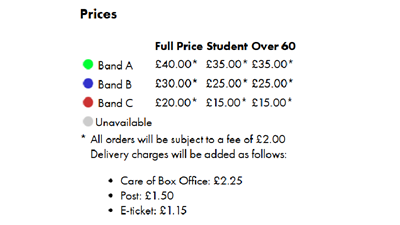
New legislation from the Competition and Markets Authority requires all mandatory fees, such as admin or booking charges, to be included in the headline ticket price.
In April 2025, the UK government announced what they described as a 'major win for consumers,' banning 'sneaky hidden fees once and for all.' This new legislation will be managed by the Competition and Markets Authority (CMA), who'll also have new powers of enforcement, under the Digital Markets, Competition and Consumers Act 2024 (DMCC Act).
The Advertising Standards Authority (ASA) have provided a useful summary of the guidance:
- Include the booking fee
- Include VAT if necessary
- Include the delivery fee
- Use 'From' prices correctly
The advice in this blog is written based on guidance from the ASA and UK government, and we'll update it if legislation evolves. However, we'd recommend reading the DMCC Act in full to consider whether any of its 32 specified practices apply to you, and checking updates to official sources directly, before formalising any changed policy or practice.
Although it's hit the headlines this year following high profile stories about ticket pricing, and bold new statements from the government, this legislation adds little that’s really new. Back in 2017, the ASA upheld a series of complaints - including several made against theatres and event venues - on the basis that existing rules made it clear that advertised prices for tickets must include all unavoidable fees and charges.
"No-one should get to the end of the booking process to discover that the final cost for tickets is greater than the price they originally saw them advertised for."
Advertising Standards Authority, 2017
What has changed in 2025 is the increased likelihood that rules will be strictly enforced - failing to comply with guidance is now a criminal offence. We don't yet know how what that will look like in practice, but if you're responsible for ticket pricing or advertising, it’s a good moment to refresh your memory and revisit your policies and practice. Even without any intervention by the authorities, unexpected charges at the end of your purchase pathway risk alienating customers and impacting revenue or loyalty.
Find out how you can update online purchase pathways, marketing campaigns, and event management policies to ensure you’re compliant with ticket fee legislation (and why price transparency is good for business!)
The most important moment in an online transaction
“The most important moment in an online transaction - the moment where you need the greatest trust between your organisation and your customer - is the moment when they pull out their wallet and make the payment. If that’s the same moment you introduce fees for the first time, and the price you’re asking them to pay increases by 10, 15%, that trust is broken.” says Spektrix co-founder & CEO Michael Nabarro.
Michael was managing a theatre in Cambridge in 2007 when he realised there must be an easier and better solution to build connections between venues and their audiences. Since then, Spektrix has focused on creating ticketing, marketing, and fundraising technology with those vital relationships at its heart.
“Though some audiences might still pay to see an artist or show they love, a lack of price transparency erodes audience trust and has a long-term customer loyalty impact,” adds Liv Nilssen, Spektrix Director of Sector Strategy. “Audience members may be less likely to attend, to donate, or to add merchandise items, because they’re already over budget on the fees.”
Liv's extensive experience in mission-driven organisations gives her a unique perspective, balancing the immediate revenue needs of non-profits with the longer term benefits of customers who feel delighted, secure, and respected in their interactions, both in-person and online.
***
We’re not legal experts. As ticketing legislation evolves, you’ll need to explore exactly what it means for your organisation - if you're in any doubt, we'd suggest a conversation with the Society of Ticket Agents and Retailers (STAR), the self-regulatory body for the ticketing industry in the UK.
We’re not resellers, so we’re not focusing on the secondary market aspect of ticketing legislation.
But we are experts in online ticketing and customer service, and in that capacity we've identified four key practices that will help you promote events and booking journeys that are compliant, secure and trustworthy, building great customer experiences and ultimately improving relationships and revenue.
We’ve pulled our examples from ASA guidance, published in April 2025. You may find slightly different language elsewhere, but we believe this gives a useful, plain English approach which is actionable for busy venue teams.
Download our full guidance on Customer Friendly Policies - advice on building lasting audience connections through honest interactions, extending a great front of house welcome into patrons’ online experiences.
Four steps to ensure your ticket sales comply with the new rules for 2025
Include the booking fee
"Quoted prices must include non-optional taxes, duties, fees and charges that apply to all or most buyers"
Advertising Standards Authority, rule 3.18
In other words, the true cost of a ticket must be upfront and obvious in the booking pathway from the beginning. This includes full transparency of any transaction or processing fees, rather than hiding fees in terms and conditions. The only exception is for fees related to a specific delivery option, such as a charge for posting paper tickets. More on that later.
We’ve all been tempted by an airline or big arena show advertising tickets for £100, only to find ourselves paying an additional £50 or £60 in service charges, processing fees and more. These 'sneaky fees' are exactly what the government's aiming to overcome with increased visibility and enforcement powers coming into effect this year. A press release from the Department for Business & Trade explained:
"The ban aims to bring to an end the shock that online shoppers get when they reach the end of their shopping experience only to find a raft of extra fees lumped on top ... It will apply to all online shopping experiences from concert tickets to trips to the cinema.
Every year a whopping £2.2 billion is spent by consumers on unavoidable hidden fees, which is why these new rules are coming into force. Not only will it create greater transparency, but it will make it far easier for consumers to confidently compare products and services to make sure they are getting the best bang for their buck."
The last thing your theatre needs is to alienate customers who are already losing trust in the ticket buying process. To set yourself apart and demonstrate transparency, make sure your total price is displayed clearly and consistently throughout the booking journey, and that the highest or total price is the most visible of all.
The majority of organisations are already following this practice, following longstanding guidance across the UK. Here are a few examples from across the Spektrix Community:
Before the booking journey
In printed materials like posters and season brochures, show a single price or price range inclusive of all fees. This will also work on your what's on pages or live event listings, before customers click 'Book Now' to enter the purchase path.


Victoria Theatre in West Yorkshire presents mainly one-night events. They list a single 'From £26.75' price point on their top level listings, linking out to further detail elsewhere in their brochure and website. They also explain clearly why their Theatre Support Fee is important and invite customer feedback.
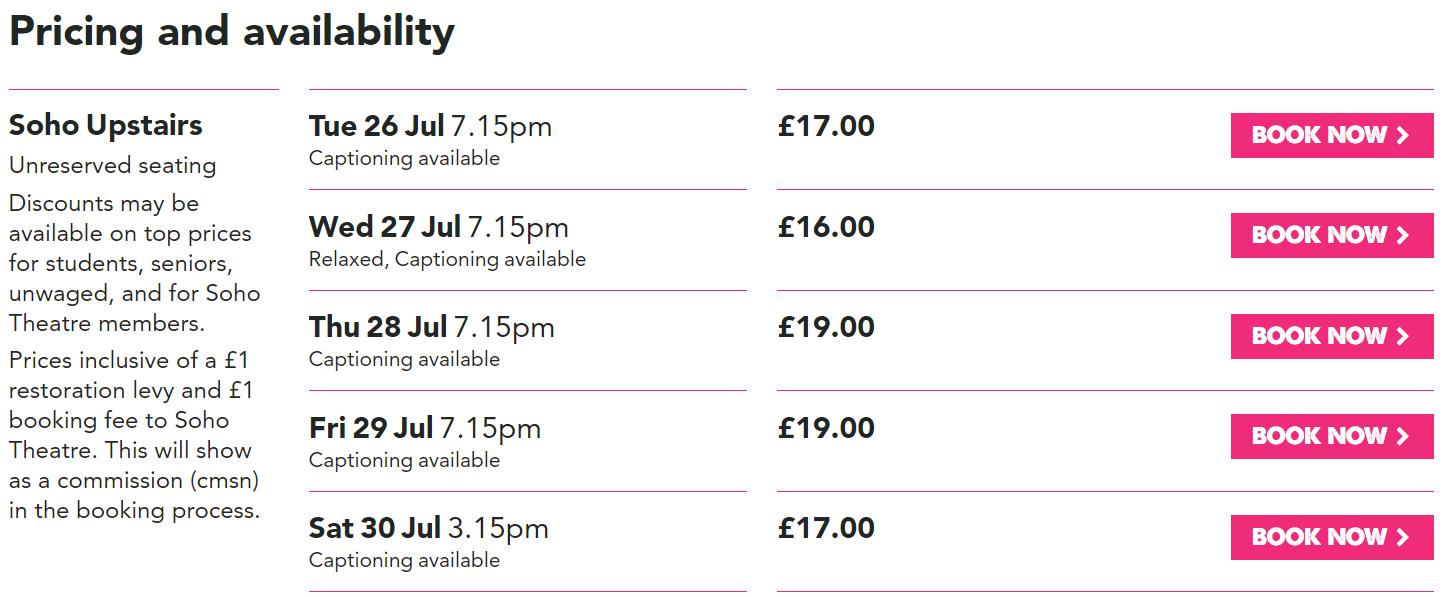
With longer runs, Soho Theatre in London lists out price points for different event dates on their website and provides detail of discounts and commissions in the text block to the left.
Within the booking journey
Once a customer enters the online booking journey, you may need to be a little more specific. This is your last opportunity to disclose full costs to ticket buyers within the advertised price.
Set up your ticketing system to itemise ticket commissions, then explore ways to show both the ticket value and the cost of any fees. How you approach this will vary depending on the number of price bands and concessions you offer, but here are some approaches already in use which we think work particularly well.
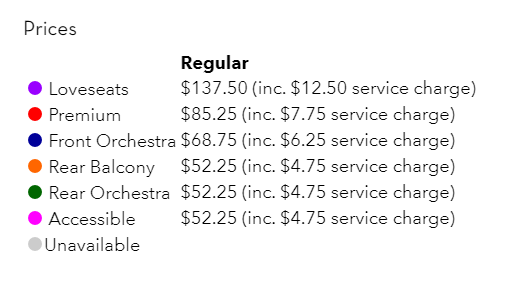
In Arizona, Fox Tucson Theatre itemise prices for multiple seating areas beside their seating chart, showing the complete price upfront and then informing customers how much of that figure is a service charge.
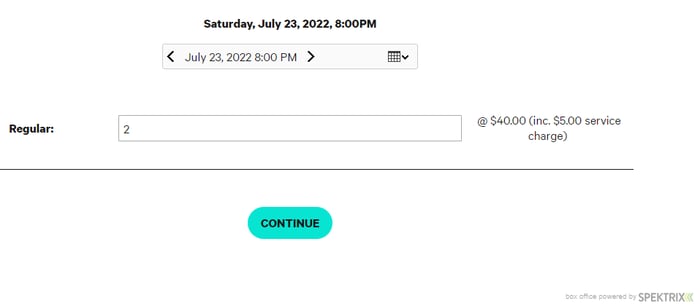
At the start of the purchase path, patrons at Two River Theater in New Jersey select the number of tickets they'd like. The complete price is listed to the right, and again it's immediately evident how much of that price is made up by the service charge.
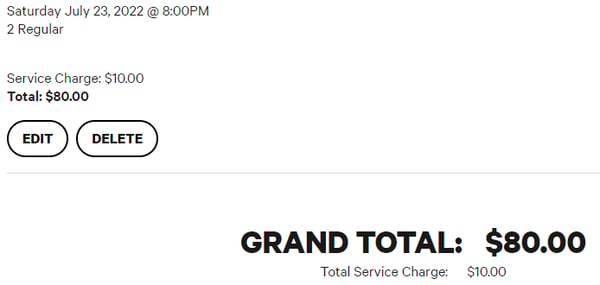
Before checkout, Two River's customers have another chance to see the complete value of their basket. The service charge is included in the Grand Total and itemised in a smaller font underneath.
Setting it up in your ticketing system
If you’re using a ticketing system that allows you to configure customers’ booking journeys on your own site, you can work with your web developers to present your own pricing and fee structure. If you’re working with a system in which transactions are completed on a different domain - often called a white-label site - you may have less control, and you’ll need to verify what steps your ticketing provider is taking to comply with the new legislation.
In Spektrix we offer both options - users can choose between a configurable booking journey on their own site, managed by a web developer, or a white-label solution provided and supported by Spektrix at no extra cost. With either option, you can configure ticket commissions to apply and display exactly as you wish across confirmation emails, seating plans and price lists, just like the examples above.
If you have complex pricing structures, you may benefit from working with a web developer to ensure this information is presented as clearly as possible. Here’s how to set up or adjust your ticket commissions.
Include VAT if necessary
"All quoted prices must also include VAT. Quoted prices can be VAT-exclusive if all those to whom the price claim is clearly addressed pay no VAT or can recover VAT. VAT-exclusive prices must be accompanied by a prominent statement of the amount or rate of VAT payable."
Advertising Standards Authority, rule 3.19
VAT rates vary for different types of event or admission ticket. If your prices include VAT at any rate, you must include it upfront in the advertised ticket price.
Usually, the clearest option for your customers is to advertise a rounded ticket price, e.g. £20, and separate the VAT from it in your accounting. This is how Spektrix works - you can select from a list of tax codes applicable in the UK and Ireland, and the system automatically calculates the VAT. This ensures that prices listed on your website will always include VAT at the right level.
Include the delivery fee
"Any freight, delivery or postal charges, including any taxes, not already included in the total price of the product but which the consumer may choose to incur, cannot be omitted from marketing communications that quote prices, given this information will constitute material information. If these optional delivery charges cannot be calculated in advance, marketers need to state that such charges are payable."
Advertising Standards Authority, rule 3.20
You may wonder if you can still charge delivery fees for tickets. The government's clear that, 'Legislation only bans unavoidable hidden fees. Optional fees, such as airline seats and luggage upgrades for flights, are not included.'
In practice, this means you can still apply reasonable charges for fulfilment methods that involve an actual cost to you - such as printing or mailing out paper tickets. Like all other charges, these fees must be quoted clearly on your website and printed marketing materials, so your customers are able to make an informed decision about their preferred method of delivery. Typically, theatres postal ticket delivery list prices within their booking information, along with further detail of commissions and refund policies, like this clear example from B:Music in Birmingham:

If you only offer a single fulfilment method and any charge applies to it, you must include it in the upfront price.
In your ticketing system, check the settings for different delivery methods to ensure you’re not adding charges for electronic/print at home tickets and to adjust the fees for other delivery methods to ensure they're reasonable. In Spektrix, you can do this by setting up delivery commissions.
Use 'From' prices correctly
“Price claims such as 'up to' and 'from' must not mislead by exaggerating the availability or amount of benefits likely to be obtained by the consumer. In practice, when using a 'from' price, advertisers must ensure a significant proportion of sale items are discounted at the maximum saving, and that these claims represent the true overall picture of the price promotion."
Advertising Standards Authority, rule 3.22
What constitutes a 'significant proportion' is determined on a case-by-case basis - but if you start with the principle of offering honest, upfront information to your audience members, it's likely you'll land on the right side of the law.
If your prices vary only by seating area within your auditorium, there's typically space on your event details page or seating plan to list specific pricing tiers - but on What's On pages, or printed materials, you may choose to simplify that information. The ASA's clear that: "If offering ticket prices for an event in which the ticket prices are of a set value, and vary according to the ticket type purchased (for example, based on the seat location in a theatre), the lowest price should be stated as a 'from' price."
If you use dynamic pricing, early bird offers, or other pricing models that vary over time, it's a little more complicated, but the same principle applies. By integrating your dynamic pricing system with your web listings, usually via a ticketing system like Spektrix, your advertised 'from' price should increase (or decrease) based on changing availability. Otherwise, provided that a significant proportion of your tickets were available at a lower price, and that you're giving an honest picture of the overall price range, you should be on safe ground even if the lowest price is no longer available - for example, because an early bird offer's expired, or because seats at your lowest price tier have sold out.
Helping the arts and culture sector offer transparency around ticket pricing
Spektrix is committed to helping theatres, arts centres, and entertainment organisations succeed. We’re happy to share our experience of supporting arts professionals across the UK, and we’d love to hear your ideas for turning this updated guidance into an opportunity to improve your customers’ booking experience.
If you’re already using Spektrix, get in touch with our Client Success team. We’re happy to support you or your web developers to make any changes you need.
***
If you’re not using Spektrix, we’re still here to help. As a certified B Corporation, we’re invested in the success of the arts sector.
Talk to one of our CRM and ticketing experts to learn how Spektrix could help you succeed

